If you’re wondering “when should I get a tattoo?” then you’ve come to the right place. Getting a tattoo is a big decision, and you should consider all the pros and cons before taking the plunge. In this article, we’ll discuss when the right time is to get a tattoo, what you need to consider, and how to make sure you’re happy with your decision. So, let’s dive in and explore the best time to get a tattoo.
Contents
Benefits of Getting a Tattoo
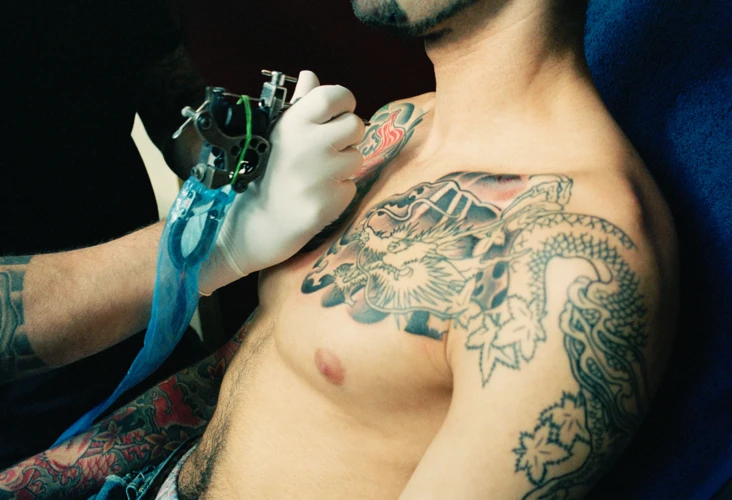
- Confidence: A tattoo can give you a sense of accomplishment and pride when you look at it. It can remind you of a special moment or person in your life, or just give you a boost of confidence.
- Artistic Expression: A tattoo is a way for you to express yourself artistically. You can work with a tattoo artist to create something unique and meaningful.
- Cost: Depending on the size and complexity of the design, tattoos can be a relatively inexpensive way to make a statement.
- Healing: For some, getting a tattoo can be a therapeutic process. It can be a way to work through difficult times and honor your journey.
When considering when to get a tattoo, it’s important to keep in mind the potential benefits that come with it.
Considerations Before Getting a Tattoo
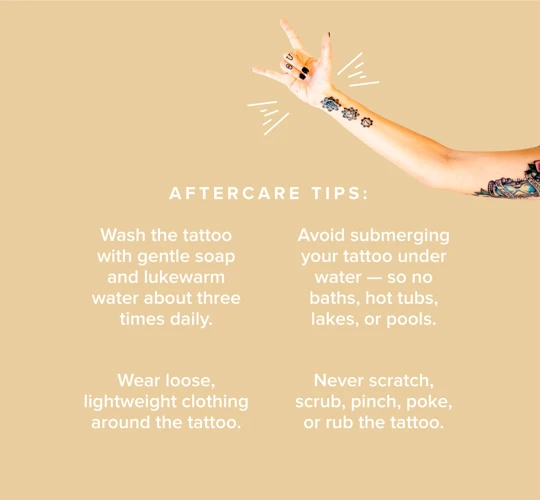
Age
Getting a tattoo is a lifelong commitment, so you should wait until you are of legal age. Before getting a tattoo, you should consider your age and maturity level. Depending on where you live, you may need to be at least 18 years old to get a tattoo.
Health
It’s also important to make sure you are in good health before getting a tattoo. If you have a medical condition or are taking any medications that could inhibit the healing process, it’s best to talk to your doctor before getting a tattoo. You should also make sure you are well-hydrated, as this can help reduce the risk of infection.
Location
The location of the tattoo is also an important factor to consider. Think about how visible the tattoo will be and whether or not it is appropriate for your lifestyle. If you are getting a tattoo for a special occasion, consider whether or not it is something you will want to show off for years to come.
Types of Tattoos
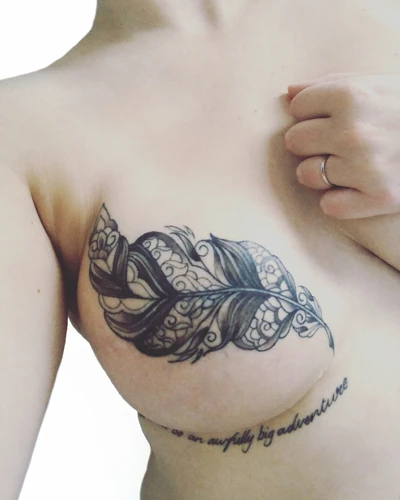
- Traditional Tattoos – Traditional tattoos feature bold lines, vibrant colors, and classic designs like swallows, roses, and nautical stars. This type of tattoo is often used to decorate the body in a way that is both aesthetically pleasing and meaningful.
- New School Tattoos – New School tattoos are bold and bright, and feature cartoon-like characters and designs that are often humorous in nature. This style of tattoo is perfect for expressing yourself in a creative and unique way.
- Black and Gray Tattoos – Black and gray tattoos are typically used to represent a particular mood or emotion. This type of tattoo is often referred to as “blackwork,” and can be used to create a beautiful and thoughtful piece of body art.
- Realism Tattoos – Realism tattoos are highly detailed works of art that often feature lifelike images of people, animals, and objects. This type of tattoo is perfect for those who want to create something truly unique and special.
- Watercolor Tattoos – Watercolor tattoos are vibrant and colorful, and often feature abstract designs and patterns. This style of tattoo is perfect for those who want to make a statement with their body art.
- Geometric Tattoos – Geometric tattoos are often used to create intricate designs and patterns. This type of tattoo is perfect for those who want to express themselves in a more abstract and creative way.
Finding a Tattoo Artist
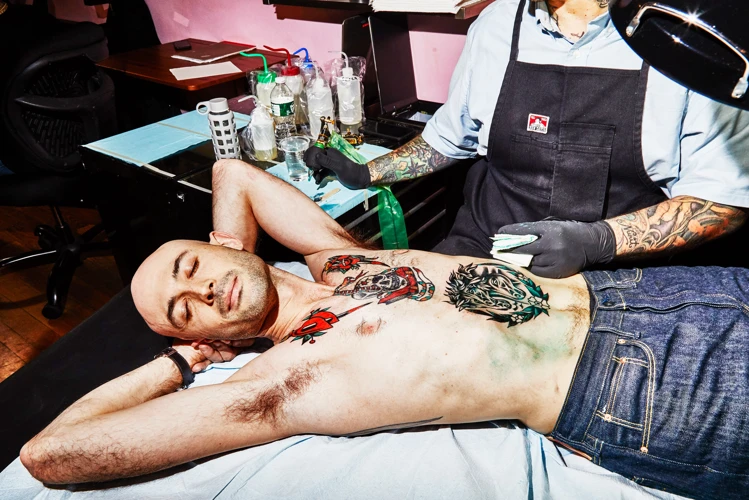
Finding the right tattoo artist is essential to the success of your tattoo. Take the time to research and find the right artist for you.
Where to Look:
- Word of mouth – Ask your friends and family who they recommend.
- Online – Check out artist portfolios on their website or social media.
- Local tattoo studios – Visit different studios to get a feel for the atmosphere and meet the artists before committing.
Questions to Ask:
- How long have you been tattooing?
- Do you specialize in any particular style?
- Can I see examples of your previous work?
- Have you ever had any complaints or issues with your work?
- Do you have a portfolio of your own work?
- Are you certified and insured?
Tips:
- Take your time – Don’t rush into anything. Make sure you’re comfortable with both the artist and the studio.
- Do your research – Ask questions and read reviews to make sure the artist is reputable and experienced.
- Be honest – Let the artist know your expectations and be open to their suggestions.
- Trust your gut – If you don’t feel comfortable with the artist or the studio, don’t proceed.
Aftercare for Your Tattoo
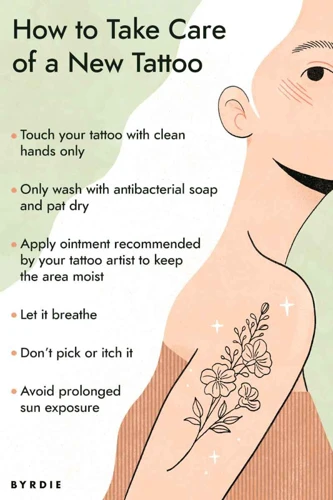
Keep It Clean: Right after you get a tattoo, your tattoo artist will apply a thin layer of ointment or petroleum jelly. Keep this on for a couple of hours. After that, your tattoo should be washed gently with lukewarm water and a mild, unscented soap. Pat dry with a clean paper towel and let it air dry.
Moisturize: After your tattoo has dried, use a small amount of fragrance-free lotion to keep it hydrated and healthy. Apply the lotion twice a day for the next few weeks, ensuring that your skin is not too dry or too greasy.
Avoid Sun Exposure: Your tattoo is still healing and needs to be protected from the sun. Wear sunscreen and cover up the tattoo with clothing when you go outside.
Be Patient: It takes time for a tattoo to heal. You may experience some itching and redness during the healing process. Avoid picking or scratching the tattoo, and resist the urge to remove the scabs.
Follow Up: After your tattoo is healed, make sure to follow up with your tattoo artist to get it touched up if necessary.
Tattoo Regret
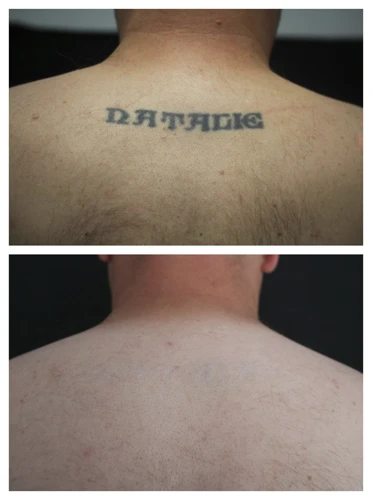
Before getting a tattoo, consider the possibility of regret. Tattoos are permanent and difficult to remove, so it’s essential to choose a design that you are happy with.
- Think carefully about the design, placement, and size of your tattoo.
- Research the artist and shop. Ensure that the artist is reputable and the shop is sanitary.
- Make sure that the tattoo is something that you are willing to live with for the rest of your life.
If you do experience tattoo regret, there are a few options available. Laser tattoo removal can be a lengthy and expensive process. It often requires multiple treatments, and some ink colors are harder to remove than others. Tattoo cover-ups or alterations are also available, but they may not always be successful.
Financial Commitment
- Tattoo costs can vary significantly: Depending on the size, complexity, and placement of the tattoo, you can expect to pay anywhere from a few hundred dollars to thousands. Additionally, you may need to pay extra for touch-ups or color corrections.
- Tattoo removal may be expensive: If you decide that you no longer want the tattoo, it can be expensive to have it removed. Laser tattoo removal can cost several hundred to several thousand dollars depending on the size and complexity of the tattoo.
- You may need to pay for follow-up visits: Depending on the size and complexity of the tattoo, you may need to pay for follow-up visits to the tattoo artist to have them touch up or color correct the tattoo.
Frequently Asked Questions
How Much Do Tattoos Typically Cost?
- Small Tattoos: Small tattoos, such as those of a size of a few inches, typically cost between $50 and $150.
Medium Tattoos: Medium-sized tattoos, such as those of a size of 6-10 inches, typically cost between $150 and $500.
Large Tattoos: Large tattoos, such as those of a size of 10-20 inches, typically cost between $500 and $2,000.
Extra-Large Tattoos: Extra-large tattoos, such as those of a size of more than 20 inches, typically cost between $2,000 and $3,000 or more.
The cost of a tattoo also depends on the complexity of the design and the type of ink used. Generally, colored tattoos cost more than black tattoos. Similarly, detailed designs cost more than simpler designs.
What are the Risks of Getting a Tattoo?
Tattoos can carry an increased risk of infection due to the use of needles and the potential for contamination of the skin and equipment. Poorly sterilized equipment or contaminated ink can cause serious infections that may require medical treatment. Other risks include allergic reactions to the ink, scarring, and the risk of damage to the skin if the tattoo is not applied correctly. Additionally, some people may experience nerve damage if the tattoo needle penetrates too deep.
Is there any way to prevent or reduce the pain of getting a tattoo?
Yes, there are several ways to reduce the pain of getting a tattoo. Applying a numbing cream or taking a pain reliever prior to the procedure can help reduce the intensity of the pain. Additionally, using a thicker needle, applying a cold compress, and taking breaks during the procedure are all methods of reducing the pain associated with tattoos.
What are the Best Practices for Caring for a New Tattoo?
- Keep it clean: Cleanse the area gently with a mild, fragrance-free soap and lukewarm water several times a day. Pat dry with a clean towel.
- Avoid direct sunlight: Keep the tattoo out of direct sunlight for at least two weeks. After that, use a broad-spectrum sunscreen with an SPF of at least 30.
- Moisturize: Apply a fragrance-free, non-abrasive moisturizer to the area to keep it from drying out.
- Wear loose clothing: Wear loose-fitting clothing to avoid irritating the area.
- Be patient: Allow the tattoo to heal completely before exposing it to chlorine, salt water, and intense physical activity.
What Should I Consider When Choosing a Tattoo Artist?
Before getting a tattoo, it’s important to find a qualified and experienced artist. Look for an artist with a portfolio of work and positive reviews. There should be a good chemistry between you and the artist; they should understand your vision and be willing to collaborate with you. Additionally, it’s important to make sure the artist is using sterile equipment and following all safety protocols. Look for a clean, professional studio and ask your artist about their licensing and sterilization procedures.
Conclusion
Tattoos can be an amazing way to express yourself, commemorate a special moment in your life, or just add a touch of beauty to your body. While it is important to make sure you are ready for the commitment and to do your research on the process, getting a tattoo is a unique and exciting experience. Consider your personal motivations, take the necessary precautions, and find the right artist to help you make your tattoo dreams a reality.